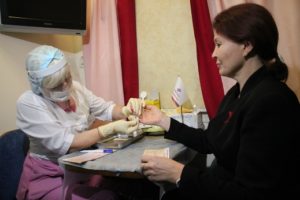Author: Anastasia Petrova, Russia

From 8 July to 20 October 2017, a train carriage went throughout the territory of Russia offering HIV testing services to everyone interested. The campaign was aimed at raising the awareness and increasing the coverage with testing services among the general public.
The strategic train
The train offering HIV testing is a project of the Russian Ministry of Health in cooperation with the Russian Railways. The campaign was initiated within the State Strategy to Combat the Spread of HIV in Russia through 2020. Long-distance passenger trains were equipped with an additional carriage offering free and confidential testing. Project workers conducted pre- and post-test counseling and informed people about HIV and the ways of its transmission. The route lied from Vladivostok to St. Petersburg and included the regions most affected with HIV. Apart from offering HIV testing on the way, mobile laboratories were also functioning on the railway stations. The campaign was aimed at the first component of the global 90/90/90 strategy, which stipulates that 90% of people living with HIV should be aware of their status.
The silent epidemic

The testing campaign covered 24 regions, with the following cities leading in terms of people tested: Chelyabinsk (2,039 people), Nizhnevartovsk (1,645 people), Irkutsk (1,446 people), Kurgan (1,290 people), and Samara (1,227 people). Moscow was the city with the lowest coverage – only 290 people got tested there. According to the Ministry of Health, within the campaign 25 thousand people were able to get tested and receive professional counseling in the carriage and in railway stations.
“The fact that those 24 regions were covered is important. Here in Russia, 10 out of 85 regions have 50% of new HIV cases, and as for the 24 regions covered, they have over 70% of such cases. That is why I think that this campaign has a concrete result as it is focused on the most affected regions,” the chief independent expert in HIV diagnostics and treatment at the Russian Ministry of Health, Yevgeny Voronin is saying.

It is interesting that no official statistics was announced on the total number of HIV cases detected. However, according to the Minister of Health, Veronika Skvortsova, as of the date when the train was passing Moscow the number of HIV positive cases detected was 248. Thus, the total number of such cases is more than 250 or 1% of the people tested. Considering the fact that testing was conducted in the general population, this number shows the severe epidemiological situation in the country and proves the tendency of HIV epidemic going beyond the key populations.
The train is off
Such campaign is an unprecedented intervention aimed at raising the awareness of people in the area of HIV/AIDS. Apart from testing passengers, the campaign was an important newsmaker. Reports in federal and regional mass media allowed millions of people in Russia to learn about the importance of this problem and about the necessity of regular testing. A positive outcome is that after the train left mobile sites to continue testing remained at some railway stations.

Alongside with that, if the data about one percent of the HIV cases detected in the general population is confirmed, it will mean that the situation has got out of control. In this case, the measures taken by the Ministry of Health are to be scaled up a hundred times and are to be aimed not only at awareness raising and detection of new cases but also at treatment. Testing as it is is not a measure of response to the epidemic. Every patient should receive therapy in order to achieve minimal viral load not to transmit the virus to other people. However, in Russia less than a half of people living with HIV get the necessary medications.



